‘To Me, This is Unconditional Love’: Lessons I Learned as a Mom to a 23-YO With Disability
Sejal Shah, founder of Mumbai-based Mariposa Foundation, sits down to explain the valuable lessons she has learned over the two decades of raising her daughter, who lives with multiple disabilities.
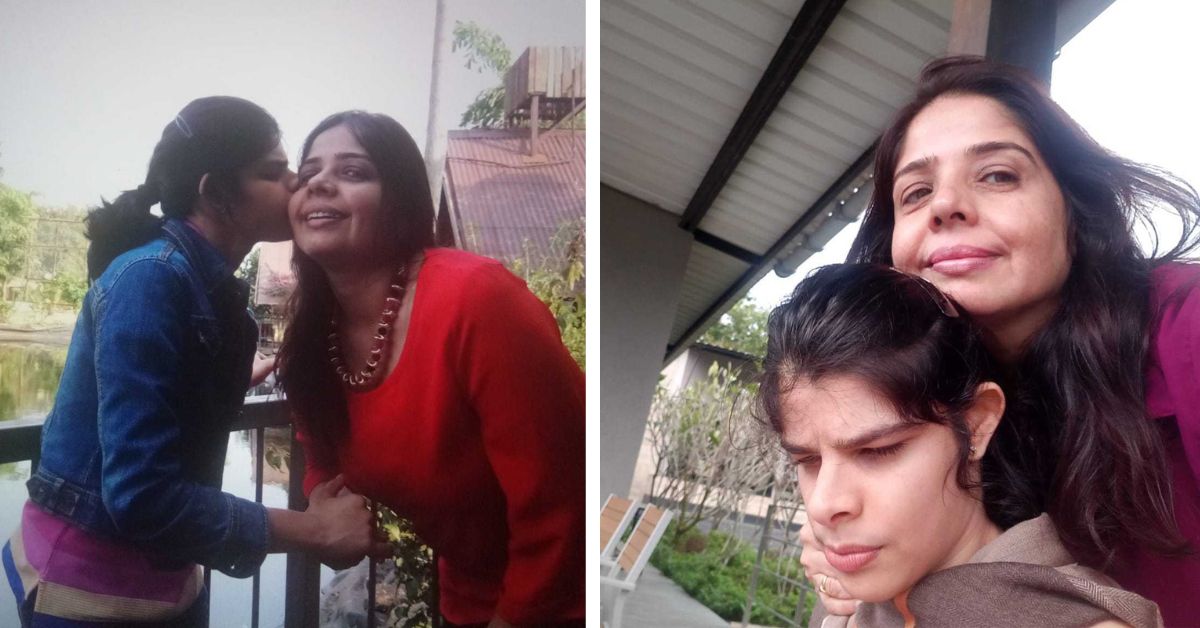
“I have learnt to take life as it comes,” Sejal Shah tells me when I ask her how she navigates the ups and downs of life while bringing up Viha, her 23-year-old daughter who lives with multiple disabilities and traits of Autism.
The Mumbai resident seems to have unshakeable resolve as she talks about embracing life as it is, powering through challenges every day, and the learnings she has had since Viha’s birth.
From Viha’s early years until 2009, Sejal’s routine was constant, to say the least. Every morning the two would make their way to the Helen Keller Institute at Byculla, Mumbai, where Viha would be trained in the nuances of basic skills, speaking, interacting with others and daily tasks.
Owing to her disabilities, Viha had never been admitted in a mainstream school. The Helen Keller Institute was her ‘home’.
But this was about to change. As the institute informed Sejal that day, it would not be able to continue helping Viha beyond the age of seven. If Sejal was keen to continue Viha’s special education with them, she would have to move her to the Vashi branch.
“Travelling to Vashi every day with a disabled child is not conducive,” Sejal shares.
But what she saw as a hurdle at the time turned out to be the biggest milestone in Viha’s — and her own — journey. The dilemma of how she could continue Viha’s education led Sejal to speak with other parents whose kids attended the institute and were also aged seven.
She wasn’t alone in her concerns. They, too, wanted their kids to have access to special education in close quarters.
It’s why in 2009 Sejal joined hands with other parents to form Mariposa Foundation, located on Grant Road in South Mumbai. This is the parents’ endeavour to help their disabled children to continue learning, growing and having a safe space.
Having mentored over 25 children with various disabilities Sejal says, “The lessons just keep coming.”
She shares these with The Better India.
1. ‘One approach does not fit all’
At the Mariposa Foundation, no two kids are the same in terms of their disability or the way they cope with it. While one child needs help with a task as simple as brushing teeth, another needs help with art. “They belong to different age groups and are at different stages in their individual journeys,” Sejal says, urging that parents should keep these individualities in mind when they guide their children.
2. ‘The focus should not be on academics alone’
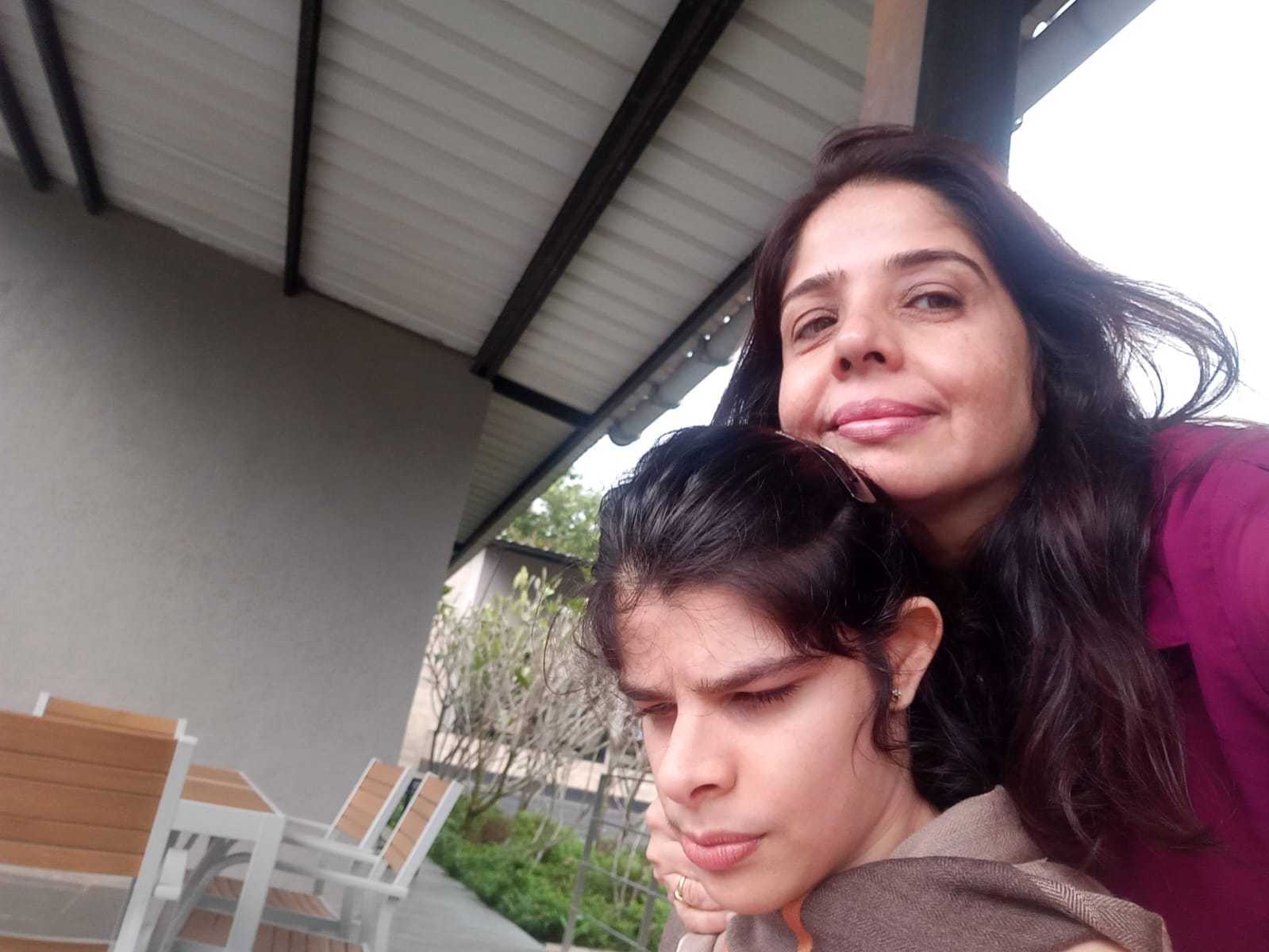
After Viha was born, Sejal took her fair share of time to come to terms with the doctor’s diagnosis. “It’s normal,” she assures other parents who may go through the same thing. “But it is important to make peace with it.”
Taking her own situation as an example, she says she learned early on that Viha does not need academics, but instead training in daily functional tasks.
“Do not measure your child’s progress in terms of degrees.”
3. ‘Understand your child’s development’
As children filter in through the doors of Mariposa every morning, there is often a short exchange of words between Sejal, who is waiting to welcome them, and their parents. These brief interactions open her eyes to the bonds that different parents have with their children.
And if she could say one thing to them, it would be to be gentler with the children.
“Disabled children evolve differently with respect to the changes happening in their bodies and the way their brains perceive things. As parents, all we can do is understand and accept.”
4. ‘Let them express themselves. It’s beautiful’
A heartwarming sight greets anyone who enters the foundation at 1 pm. All the children sit in a circle singing songs, saying prayers and reciting poems. The activity, aptly called ‘Circle Time’, encourages the children to interact with others and express themselves in a way they know best.
Sejal shares how lovely it is to watch them say “hello” to each other or greet their friends before they proceed to do the other activities with their mentors, who are with them throughout the day.
Sejal’s ways of interviewing her potential mentors and volunteers is unique. Bypassing the usual questions about qualifications and book knowledge, she asks, “Are you ready to love these kids the way they are?” This and a week-long observation forms the ground for hiring.
Elaborating on the advantage of this practice, she shares, “When dealing with disabled people, what matters more than being well versed with textbook terms is how you interact with them and the tact you use.”
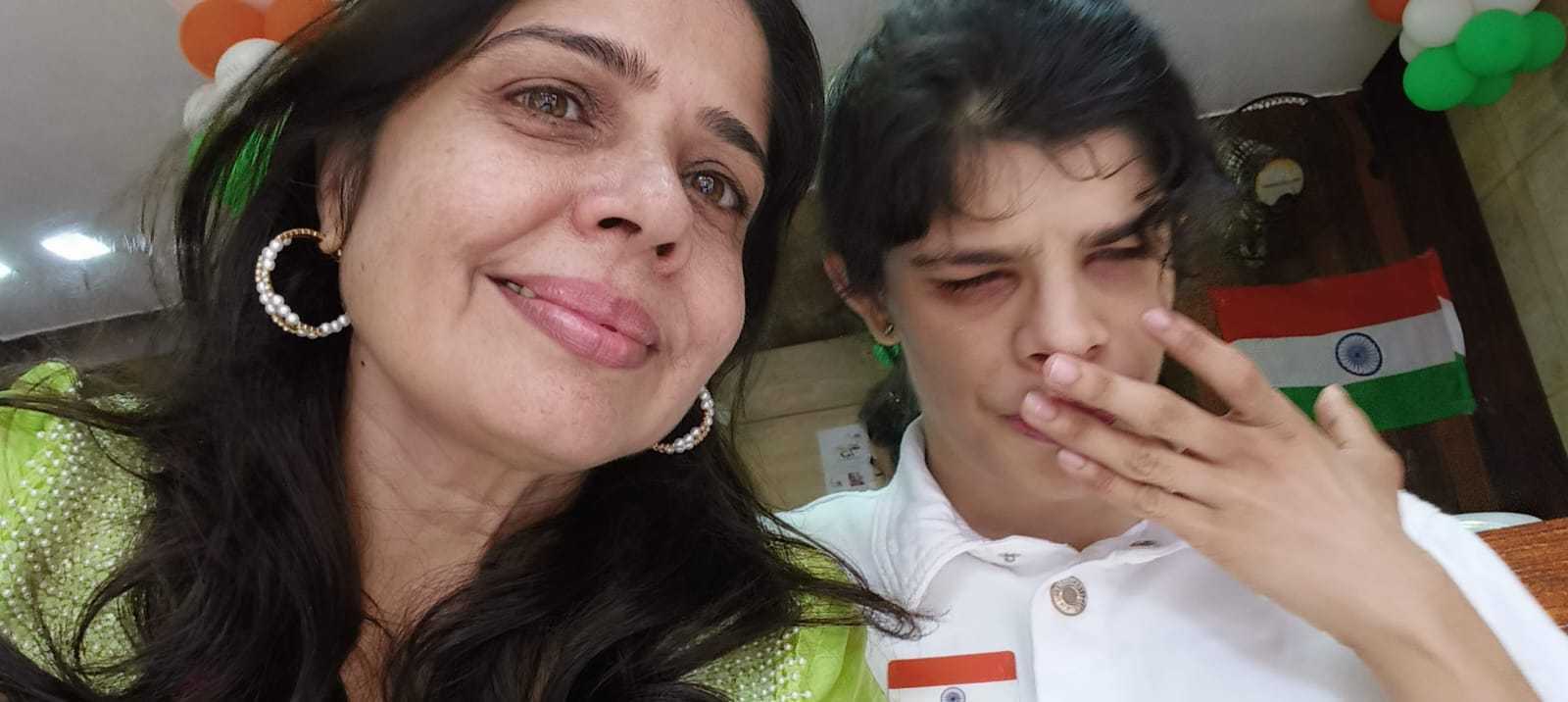
5. ‘You will learn to have incredible patience’
There are times when Sejal teaches Viha a simple task, and Viha does not pick it up immediately. Sometimes, weeks pass by before she shows signs of progress. “But that’s completely okay,” Sejal argues. She encourages parents to not lose hope, as she agrees it can be demoralising to train your child in a task and go months without seeing positive signs of recall.
“In times like these believe that your child is learning. The day will come when they prove that to you.”
6. ‘Adapt your methods of teaching’
To add to the previous point, Sejal advises parents to modify the techniques they are using to teach their kids daily skills. “Some days I try music, some days I try art, and other days simply love,” she says.
7. ‘Slow down’
“When Viha is taking time to chew, I cannot tell her to hurry up as I have something else to do.”
Sejal adds, “I have to wait until she has finished.” These and other experiences have taught this mother the art of slowing down in life and of taking each moment as it comes.
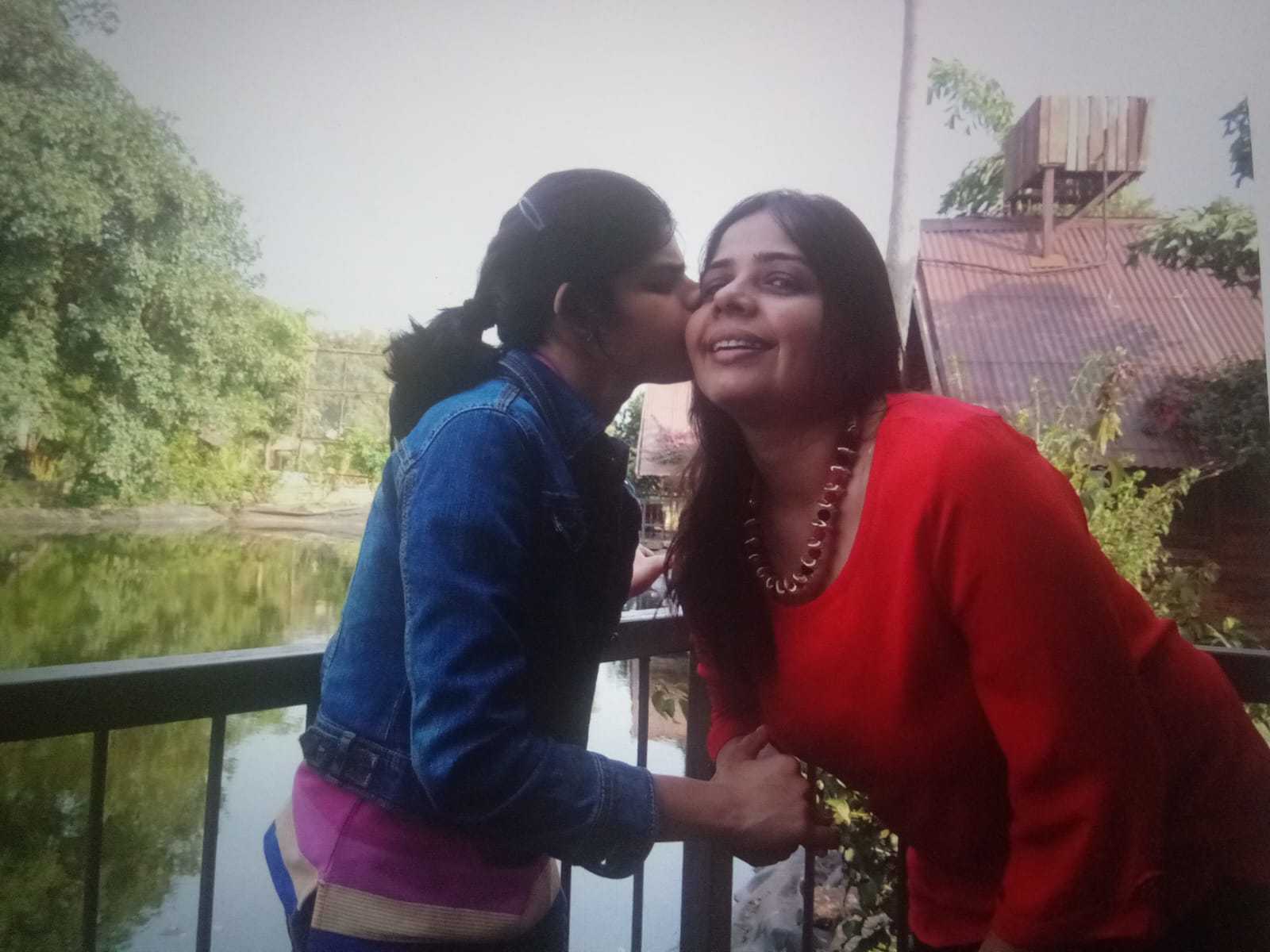
8. ‘Unconditional love exists’
When Sejal is having a bad day, she does not assume that Viha will understand that through her behaviour. But sometimes Sejal is surprised by how Viha will come to her and just stay still, as if showing her she isn’t alone. Sejal says the dynamics of emotional bond between disabled children and their parents exist — they just may be different.
“That to me is unconditional love.”
9. ‘Do not expect’
Rarely do thoughts like “Will Viha care for me in my old age?” or “What does the future look like?” cross Sejal’s mind.
She says she has come to believe that she needs to be strong and live a life without expectations. Although these questions are normal for any parent to have, Sejal points out that things change when you have a disabled child. “You can’t live with expectations for the foreseeable future. You take life as it comes.”
10. ‘Blanket advice is of no help’
When parents of disabled children share their struggles with Sejal, she empathises but does not dish out advice on how they should be doing things. “Families are different in terms of the moral support they offer the mother or the kind of awareness there is about disability… I feel blessed to be able to run a centre and advocate for what my daughter needs. But I can’t ask every parent to do the same.”
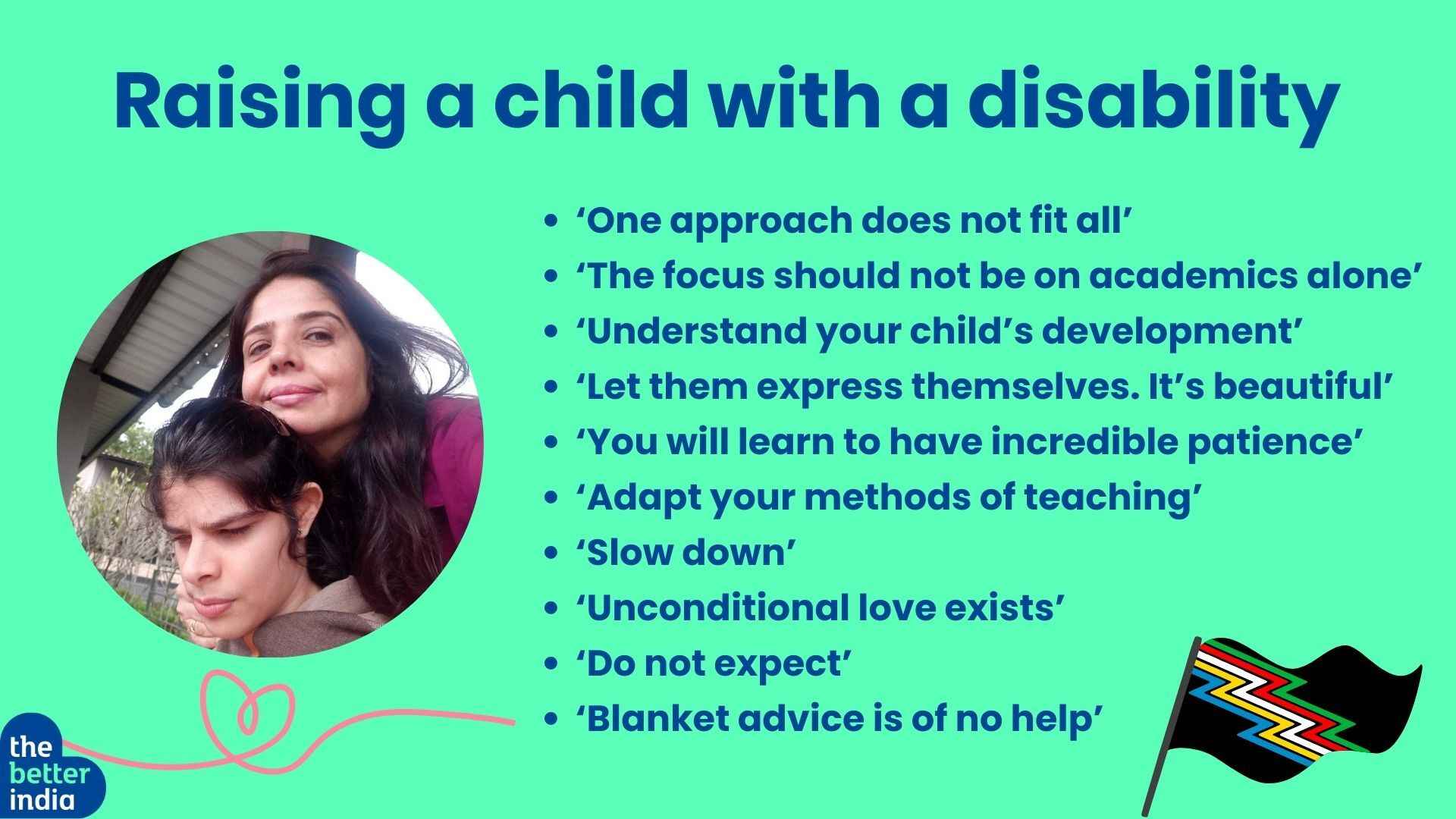
Edited by Divya Sethu
If you found our stories insightful, informative, or even just enjoyable, we invite you to consider making a voluntary payment to support the work we do at The Better India. Your contribution helps us continue producing quality content that educates, inspires, and drives positive change.
Choose one of the payment options below for your contribution-
By paying for the stories you value, you directly contribute to sustaining our efforts focused on making a difference in the world. Together, let’s ensure that impactful stories continue to be told and shared, enriching lives and communities alike.
Thank you for your support. Here are some frequently asked questions you might find helpful to know why you are contributing?


This story made me
-
97
-
121
-
89
-
167













